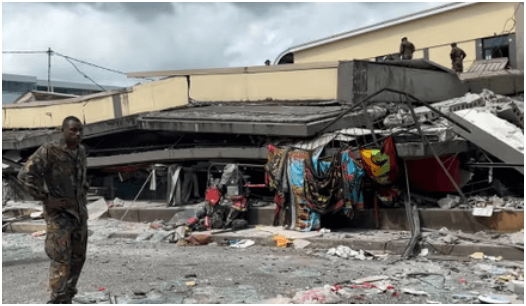Vanuatu Faces Crisis: Devastating 7.3 Magnitude Earthquake Claims Lives and Shatters Communities
The Pacific island nation of Vanuatu is reeling in the aftermath of a powerful 7.3 magnitude earthquake that struck its shores, leading to widespread devastation and a tragic loss of life. At least 14 people have been confirmed dead, and the nation has declared a state of emergency as authorities scramble to assess the extent of the destruction and mount search and rescue operations. The quake, which struck with terrifying force, has left communities shattered and countless families displaced, as rescuers race against time to locate survivors trapped under the rubble.
The earthquake’s impact was felt across Vanuatu, shaking homes, toppling buildings, and triggering landslides that blocked critical roads. The tremor struck during the early hours when most residents were asleep, amplifying its deadly impact as unprepared communities were caught off guard. Eyewitnesses described scenes of chaos as people fled their homes in panic, seeking refuge in open spaces while buildings crumbled around them. In some areas, the ground opened up, swallowing entire sections of roads and leaving gaping fissures in the earth.
Local hospitals have been overwhelmed by the influx of injured individuals, with medical personnel working tirelessly to provide care amid resource shortages. Emergency responders are facing immense challenges due to the extent of the damage, as well as the remoteness of many affected areas. Vanuatu’s rugged terrain and the widespread destruction of infrastructure have significantly hindered relief efforts, delaying the delivery of aid to the most vulnerable. Helicopters and boats are being deployed to reach the hardest-hit islands, where communication lines have been severed, leaving residents isolated and desperate for help.
The government of Vanuatu has issued urgent appeals for international assistance, highlighting the nation’s limited capacity to deal with a disaster of this magnitude. Neighboring countries and global humanitarian organizations have responded swiftly, dispatching search and rescue teams, medical personnel, and essential supplies to aid in the relief effort. Australia and New Zealand, longstanding partners in the Pacific region, have sent aircraft laden with food, water, and emergency shelter kits, while the Red Cross and other NGOs have mobilized resources to support the crisis response.
Survivors recount harrowing stories of survival and loss, painting a grim picture of the earthquake’s toll on communities. In one village, a family of five was rescued from beneath the rubble of their collapsed home after hours of digging by neighbors and rescue workers. However, not all stories have ended in relief. In another area, an entire family was buried when a landslide engulfed their home, leaving grieving relatives to mourn their loss. The emotional and psychological scars of the disaster are evident, as survivors grapple with the trauma of what they have endured.
Efforts to recover bodies and clear debris are ongoing, but the process is slow and arduous. Heavy machinery has been brought in to assist with the cleanup, but many areas remain inaccessible due to blocked roads and collapsed bridges. In addition to the immediate task of rescue and recovery, authorities are also contending with the risk of aftershocks, which could further destabilize already fragile structures and pose additional hazards to rescue teams and residents.
The earthquake has underscored Vanuatu’s vulnerability to natural disasters, a reality that the island nation has faced repeatedly due to its location in the seismically active Pacific Ring of Fire. The country is also highly susceptible to cyclones, rising sea levels, and other climate-related challenges, making disaster preparedness a critical priority. In the wake of this latest tragedy, calls for stronger international support to bolster Vanuatu’s resilience and response capabilities have gained urgency. Experts emphasize the need for investment in disaster-resilient infrastructure, early warning systems, and community training to mitigate the impact of future calamities.
As the immediate focus remains on saving lives and providing relief, longer-term concerns are beginning to emerge. Thousands of people have been displaced, their homes reduced to rubble, and their livelihoods destroyed. Farmers in rural areas have reported extensive damage to crops and livestock, raising fears of food shortages in the weeks and months ahead. The destruction of schools, clinics, and public buildings has further compounded the challenges, leaving communities without access to essential services. Rebuilding efforts are expected to be a long and costly process, requiring sustained support from the international community.
The human spirit, however, remains resilient amidst the devastation. Communities have come together to support one another, sharing whatever resources they have and offering comfort to those in need. Local volunteers have joined rescue teams, braving dangerous conditions to help search for survivors and clear debris. Religious and cultural leaders have also stepped forward to provide solace and guidance, emphasizing the importance of unity and hope during these trying times.
Environmental and humanitarian experts warn that Vanuatu’s experience should serve as a wake-up call for the global community. The increasing frequency and intensity of natural disasters in vulnerable regions highlight the urgent need for coordinated international action to address the underlying factors driving such crises. Climate change, in particular, remains a significant threat, exacerbating the risks faced by island nations like Vanuatu. Strengthening global commitments to reduce greenhouse gas emissions, support climate adaptation, and provide disaster relief funding are critical steps in addressing these challenges.
In the days ahead, the focus in Vanuatu will shift from rescue to recovery, as authorities work to restore order and begin the arduous task of rebuilding. For now, the priority remains on saving lives, providing shelter and medical care to survivors, and ensuring that those affected by the earthquake are not forgotten. The resilience and determination of the Vanuatu people, combined with the support of the international community, will undoubtedly play a crucial role in overcoming this tragedy and laying the groundwork for a stronger, more prepared future.
Stay informed with the latest updates – click here .

